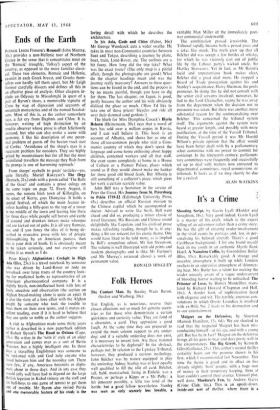Folk Heroes
The Contact Man. By Stanley Wade Baron. (Seeker and. Warburg, 30s.) The Contact Man. By Stanley Wade Baron. (Seeker and. Warburg, 30s.) TILE English, as is notorious, reserve their closest affections not so much for genuine eccen- trics as for those who demonstrate a certain quirkiness and curiosity value. They are fond of a character, a card. They appreciate a good laugh. At the same time they are prepared to extend the most solemn support to any under- dog; and if a suitable underdog does not exist, it is necessary to invent him. Are these national characteristics to be deplored? In the abstract, perhaps not. In relation to the Lynskey Tribunal, however, they produced a curious mythology. John Belcher was by nature equipped to play the underdog. Sidney Stanley was at least equally well qualified to fill the role of card. Belcher, tall, bald, moustached, living in Enfield, was a Pooter, or perhaps a Kipps or a Mr Polly : a bit innocent possibly, a little too fond of the bottle. but a good fellow nevertheless. Stanley was seen as only scarcely less lovable, a veritable Max Miller of the immediately post- war commercial underworld.
The combination proved irresistible. The Tribunal rapidly became both a period piece and a joke; like snoek. The myth grew up that all Belcher did was accept a few bottles of whisky, for which he was viciously cast out of public life by the Labour party's wicked uncle, Sir Hartley Shawcross. Yet in fact, as Mr Baron's lucid and unpretentious book makes clear, Belcher did a great deal more. He stopped a Board of Trade prosecution against his and Stanley's acquaintance, Harry Sherman, the pools promoter. In doing this he did not consult with the senior civil servants involved; moreover, he lied to the Lord Chancellor, saying he was away from the department when the decision not to prosecute was taken. But there was another, more substantial reason for the sentimentalising over Belcher. This concerned the tribunal system itself. The arguments against the system were heard at greater length, and possibly with more justification, at the time of the Vassall Tribunal. During the Vassal! period it was Mr Harold Wilson's private opinion that the affair would have been better dealt with by a parliamentary select committee with no power to commit for contempt. In the nineteenth century, parliamen- tary committees were frequently and successfully set up to deal with matters now entrusted to departmental committees, royal commissions or tribunals. It looks as if we may shortly be due for a revival.
ALAN WATKINS


































 Previous page
Previous page